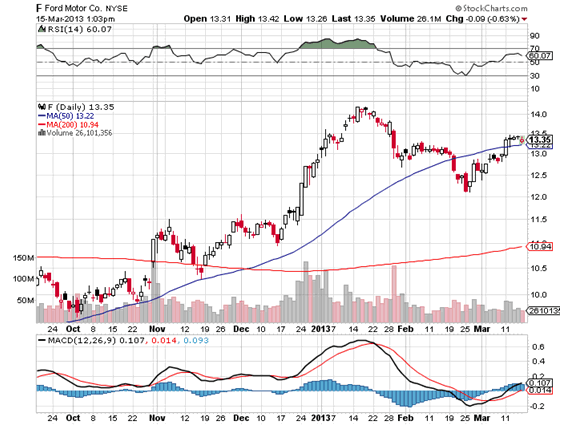Greenspan Says No “Irrational Exuberance” for Stocks. But Wasn’t He Wrong Last Time?
Stock-Markets / Stock Markets 2013 Mar 19, 2013 - 07:38 PM GMTGeorge Leong writes: The market appears to have another bull leg, with the Dow closing higher in 10 straight sessions, setting multiple record-highs in the process.
With the advance, there are now questions regarding the sustainability with arguments on both sides. Even former Federal Reserve Chairman Alan Greenspan went on CNBC and suggested the stock market did not show “irrational exuberance,” saying stocks were cheap. (Source: Belvedere, M.J., “Greenspan: No ‘Irrational Exuberance’ in Stocks Now,” CNBC, March 15, 2013.) There have been others also supporting the bull case, yet some pundits have also come out and suggested the market is set for a downfall.
While I’m encouraged by the recent rally to multiyear highs, I believe the rapid pace of the advance is not sustainable and stocks are priming for a setback, but I’m not sure when or by how much. I do believe 2013 will be positive for stocks, but at this time, you also need to be aware of the risk and vulnerability on the charts, especially with the S&P 500.
So while the global economy is improving, the catalyst for the upward move in stocks has largely been the easy monetary policy worldwide that has resulted in a low interest rate environment and the search for alternative investments to low-yielding bonds. Without the easy money, I highly doubt stocks could have risen at such a rapid pace.
At this time, you need to think about a viable investment strategy in case stocks falter.
One investment strategy would be to take some profits off the table, but then you may miss out on a potential stock market rally.
You can buy into new positions and assume the risk of a market correction, but a much safer and prudent investment strategy alternative is to play the upside via the use of call options. This would allow you to take advantage of any upward move in the equities market, while managing the maximum risk you have via this option investment strategy.
Let’s say you feel the economic recovery will continue to drive auto sales, but you are also worried about a possible economic downfall given sequestration and Europe.
You like what Ford Motor Company (NYSE/F) is doing and feel the stock may be headed higher. But instead of buying the stock outright, you can play Ford via call options that will add leverage and limit the loss to the premium paid, which is a good investment strategy.

Chart courtesy of www.StockCharts.com
Let’s take a look at Ford; assume you want an option investment strategy that equates to 1,000 shares of Ford. You feel Ford could rally to $16.00 by December 2013.
You buy 10 call contracts of Ford, equal to 1,000 shares of the underlying stock. You look at the December 2013 expiry for the Ford in-the-money $12.00 call for a premium of $1.93. The cost per contract of $193.00 equates to $1,930 for the 10 contracts, which is the maximum risk under this investment strategy. If Ford fails to hold at $12.00 by the December 20, 2013 expiry, the premium you paid is lost in this investment strategy. The upside breakeven is $13.93, and there’s a good chance Ford will trade above this level by the expiry.
Now, say Ford jumps to $16.00 by the expiry; you would make $2.07 per share, or $2,070 for the 10 contracts, for a leveraged return of 107% in less than a year under this investment strategy. The maximum risk is $1,930, but you more than double your money if Ford climbs to $16.00 by the expiry, which is a good risk-to-reward investment strategy.
You can use the Ford example with many stocks that may interest you as a lower-risk investment strategy alternative to buying the stock, especially given the current market risk.
Please note: the above example is meant for illustrative purposes only and should not be construed as an actual trade or buy recommendation.
Source:http://www.investmentcontrarians.com/...
By George Leong, BA, B. Comm.
www.investmentcontrarians.com
Investment Contrarians is our daily financial e-letter dedicated to helping investors make money by going against the “herd mentality.”
George Leong, B. Comm. is a Senior Editor at Lombardi Financial, and has been involved in analyzing the stock markets for two decades where he employs both fundamental and technical analysis. His overall market timing and trading knowledge is extensive in the areas of small-cap research and option trading. George is the editor of several of Lombardi’s popular financial newsletters, including The China Letter, Special Situations, and Obscene Profits, among others. He has written technical and fundamental columns for numerous stock market news web sites, and he is the author of Quick Wealth Options Strategy and Mastering 7 Proven Options Strategies. Prior to starting with Lombardi Financial, George was employed as a financial analyst with Globe Information Services. See George Leong Article Archives
Copyright © 2013 Investment Contrarians- All Rights Reserved Disclaimer: The above is a matter of opinion provided for general information purposes only and is not intended as investment advice. Information and analysis above are derived from sources and utilising methods believed to be reliable, but we cannot accept responsibility for any losses you may incur as a result of this analysis. Individuals should consult with their personal financial advisors.
Investment Contrarians Archive |
© 2005-2022 http://www.MarketOracle.co.uk - The Market Oracle is a FREE Daily Financial Markets Analysis & Forecasting online publication.



